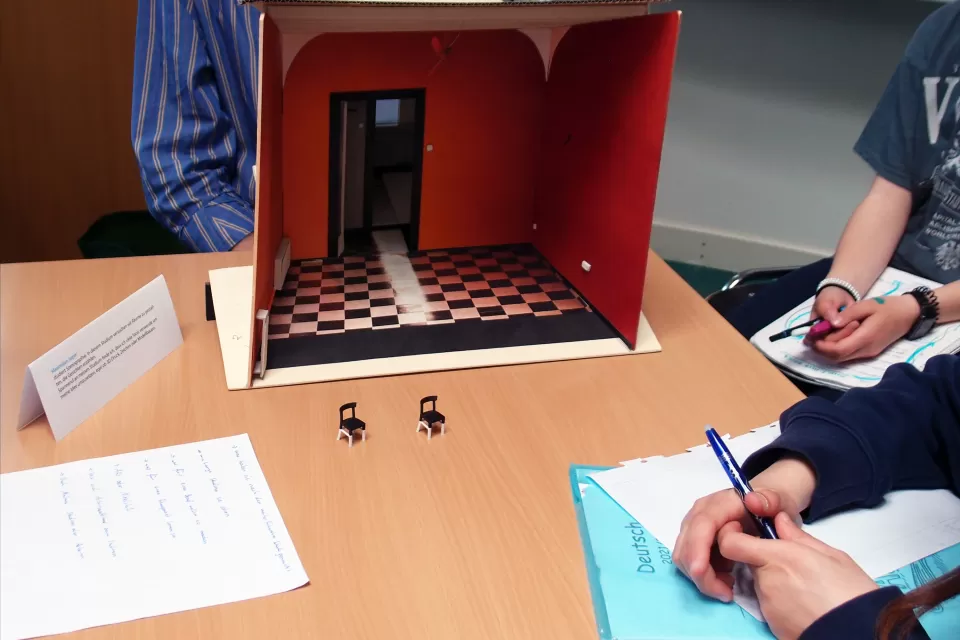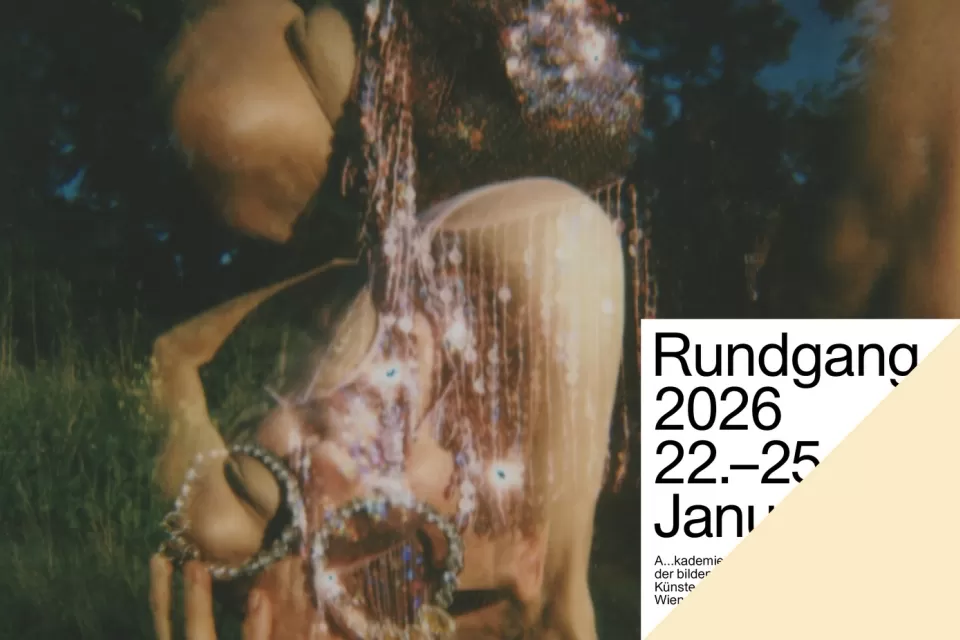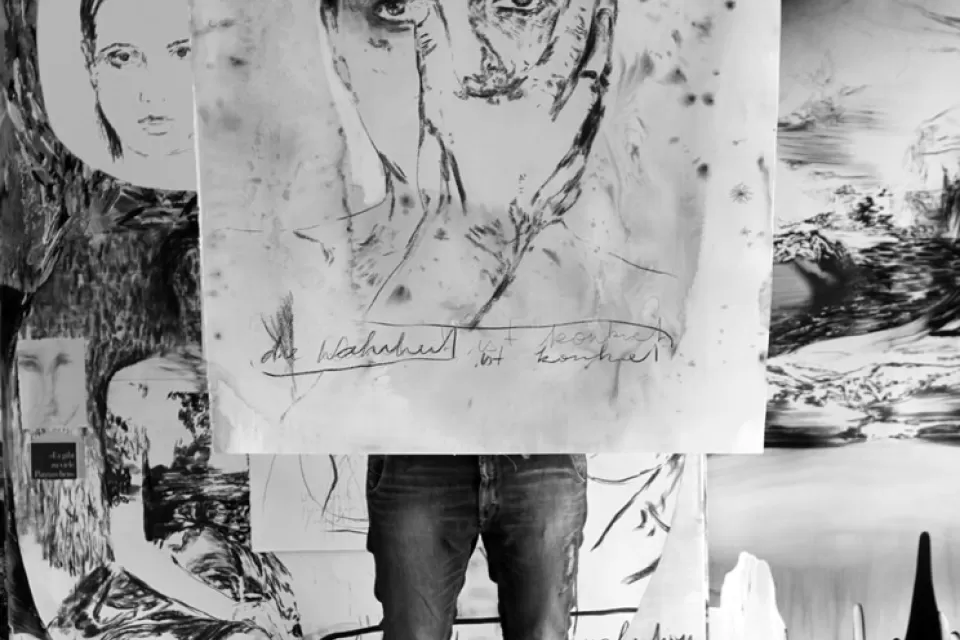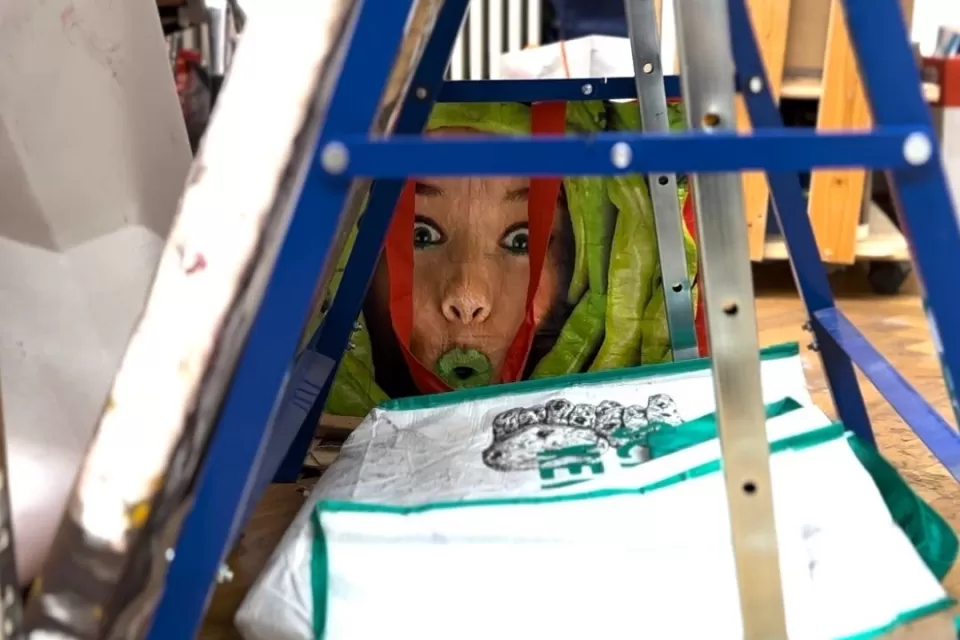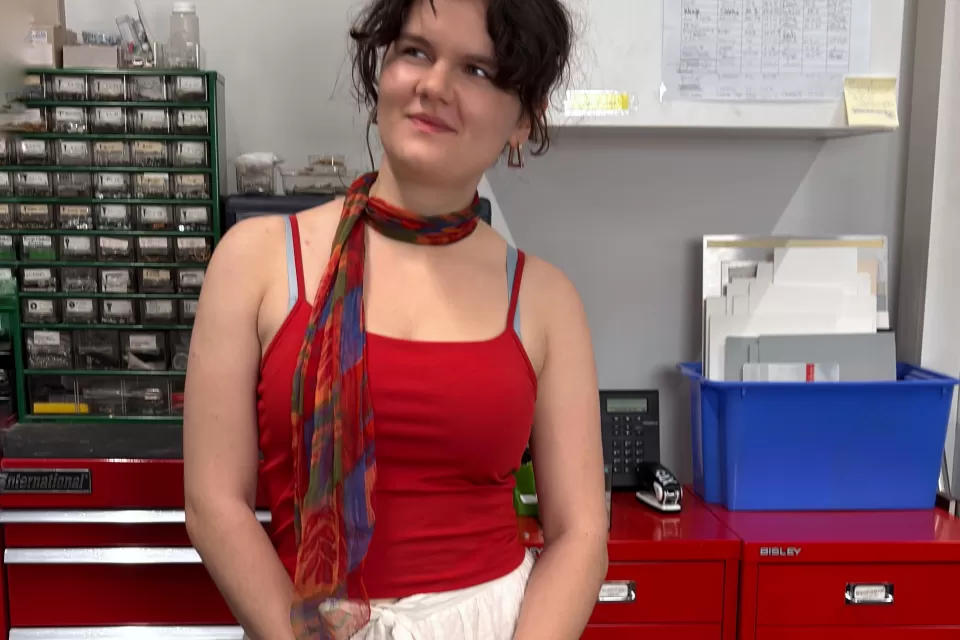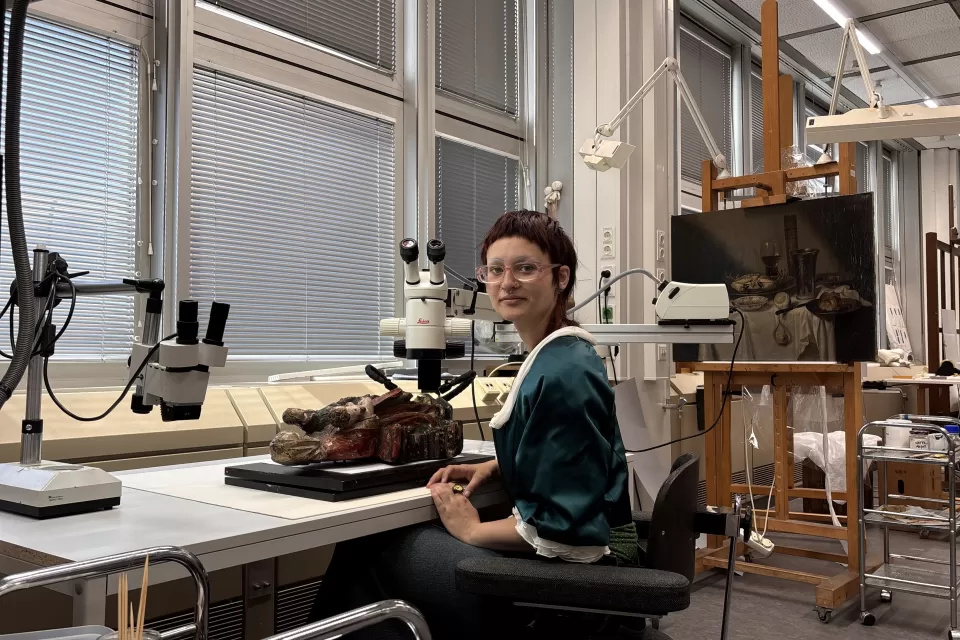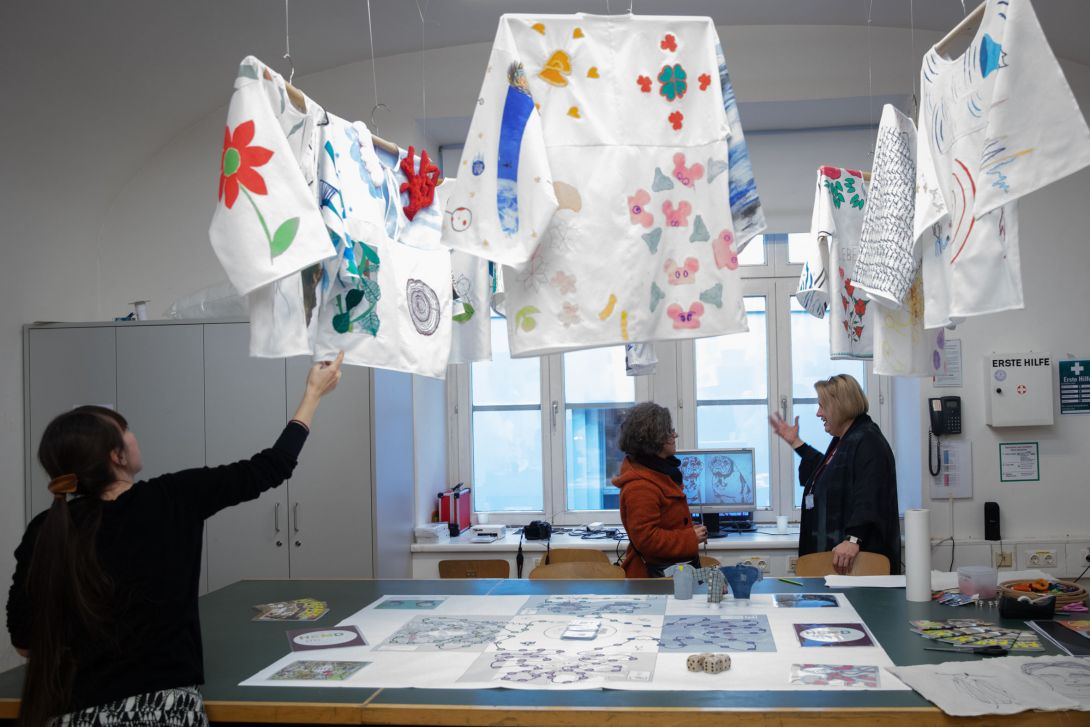
© eSeL.at
Studying at the Institute for Education in the Arts - Through the Lense of two Art Students
Author: Lea Gander (UGC)
Two students at the Institute for Education in the Arts sharing about their paths. They talk about the application process, portfolio submission, daily lifes as a art student and the perspectives after graduation.
What is it like at the Institute for Education in the Arts? How do you manage the daily life? What can you do after you finish? All these questions are part of the Podcast Series of Lea Gander.
Lea: Hello, I'm Lea. I study at the Institute for Education in the Arts (IKL) at the Academy of Fine Arts in Vienna. I study Art and Education and Design in Context, so both subjects. Just like my colleague Luca.
Luca: Hi.
Lea: And we're going to chat a bit about the entrance exam, student life, and post-graduation opportunities, and anything else that comes to mind. I'll be asking Luca some questions.
Luca: Exactly. I'm really looking forward to it.
Lea: I am too.
Luca: I'm very excited.
Lea: Okay Luca, so why did you choose to study at IKL in the first place?
Luca: Well, I wanted a study program where I could get artistic training and also a specific education for a concrete field. I quickly realized that art education was the right choice for me. I looked around and found out about the options in Austria, and IKL seemed to be the best fit for me. So, I applied, got accepted, and here I am.
Lea: Cool! It was similar for me. I really wanted to work with people. I enjoy doing art and working with my hands, so I was trying to find a way to combine these interests. That's where art education came in. It's great because it provides a sense of security after graduation, unlike studying fine arts by itself. That's why I chose it. But before you can start studying, you have to take the entrance exam. Luca, could you explain how that works?
Luca: Sure, there are three specific tasks: there's the portfolio, where you showcase your private artworks, what you're interested in and what you enjoy doing. It's basically a presentation of your interests. Then there's the artistic task, where you receive a topic and create an artistic work within a day and then present it to the examination committee. But I think there's no need to be afraid. I was nervous myself, but it was a very nice, welcoming atmosphere. It didn't feel like a test. And there's also the pedagogical suitability part, which is more about understanding people. It's not so much about what you know or your skills, but whether you can assess people well and interact with them effectively.
Lea: Exactly. In detail, for us, we watched videos of teaching situations during the pedagogical suitability assessment. Then we discussed them together. Overall, the atmosphere during the entrance exam was really nice and clear about what was expected from us. I felt comfortable, even during the interview. It felt welcoming, and you could tell that they wanted you to be part of the program and were very supportive. You can also sign up for a portfolio consultation, if you want. It happens once a year, I think. I found it very helpful for organizing my portfolio, knowing what to prioritize and what to include. But I think the key is to stay authentic.
Luca: Exactly, and just show what topics interest you. I would also definitely recommend to go to the “Rundgang” (note: open doors event). It's always a highlight of the academic year, there we showcase the facilities and possibilities at the university. It gives you a good first impression.
Lea: Exactly! You can visit the workshops, and if you study here, you can exhibit your work there. It's quite nice.
Luca: Exactly! One always has the opportunity to exhibit, which is not something you can take for granted, especially in one's studies, to be able to participate in exhibitions already.
Lea: And maybe at this point, we can mention the Atelier Kollektiv at the institute. Once you're a student, you can use the studio spaces. The Atelier Kollektiv consists of students who organize various events, exhibitions, and everyone is welcome to participate. I initially thought it might be for more advanced students, but that's not the case. They are happy when people want to get involved, and you can bring your own ideas or suggestions for events. Speaking of student life or the sense of community, how do you feel about that?
Luca: It's very familial. The hierarchies are very low; you address your teachers by their first names, which I find very pleasant. Most of my friends are from IKL; I've made a lot of friends there, and I'm very happy with the sense of community at the institute.
Lea: Absolutely. I feel the same way. Of course, it's not always perfect, but having a supportive community makes a difference. It helps when there's a nice atmosphere when you're going through challenges together. It's not just the relationship between students that's great; the connection with professors is also important. If you need advice or help, they are always there for you. It's nice to know your professors and fellow students on a personal level.
Luca: Exactly, and you also see the same classmates frequently. You build connections naturally.
Lea: Yes, it's a nice, close-knit community. There's also the kitchen at IKL, where students can cook together.
Luca: Yes, coffee is crucial [both laugh], and we enjoy breaks together there.
Lea: Definitely, the student union also organizes events in the kitchen, like game nights. So, the kitchen is an important part of student life. Moving on to the academic side, what are your favorite subjects or workshops? We're talking about both disciplines here, Art and Education, and Design in Context. Let's focus on one of them; maybe people who are interested in just one of the subjects are listening. So, in Design in Context, what do you find great about it or how do you feel about it?
Luca: Definitely the workshops. I have easy access to various tools and equipment that I wouldn't normally have the chance to explore. I have access to the screen-printing workshop, I can do ceramics, work with metal and wood. Also, the fact that materials are provided for free makes it accessible for everyone, which is great. There's a very low financial contribution for students.
Lea: Absolutely, that's great! You can use all the things there, and what I also find cool about the workshops is that sometimes you might not feel so inclined towards a particular workshop. So, there's ceramics, printing, the sewing workshop, wood, metal, and did I forget something?
Luca: Hmm, yes, there's screen-printing, for example.
Lea: Yes, there is, that falls under printing, I believe.
Luca: Exactly!
Lea: What I find cool about the workshops is that sometimes you might not be initially drawn to a particular workshop, but since it's mandatory, you end up trying it out. Through these mandatory workshops, I've discovered passions I didn't know I had. Sometimes you might not think you'll enjoy a particular workshop, but because it's mandatory, you give it a shot. And then there are open workshops where you can work on your personal projects, independent of mandatory classes. It's great because you can expand your skills. Another interesting aspect is the pedagogical part. We both do it internally at the institute. However, for those who combine their studies with the University of Vienna, such as studying Italian and Design in Context, the pedagogical part is divided between the University of Vienna and IKL. We do it all at IKL, which I find very convenient. The KKP (Cultural and Artistic Education) courses at IKL are also fascinating. There are elective courses, and I really enjoyed Theater Pedagogy. I believe you took some elective courses you liked too, right?
Luca: Yes, exactly. There are courses on topics like Critique of Racism in the School Context and Heteronormativity in School Textbooks. These courses provide insights into social issues that are crucial to address, even during our studies, because we will encounter them in our professional lives.
Lea: Definitely. At IKL, we learn a lot of valuable things that apply to our personal lives, such as recognizing subtle discrimination and viewing the world from different perspectives. It's liberating to receive all these inputs. Sometimes there are stereotypes about pedagogy being boring, but at IKL, the readings are incredibly interesting. Regarding the diverse student body, who would you say is the typical IKL student?
Luca: There isn't one. That's the cool thing. We have students from various age groups, with different backgrounds and experiences. Some have studied art before, while others have just graduated from high school. Some have been working for a long time and are now seeking a career change. This diversity enriches our lectures and discussions. It's personally enriching to interact with people from such varied backgrounds.
Lea: Exactly. It's amazing to learn about so many different perspectives and realities. There's a valuable exchange of ideas. Let's talk specifically about the Art and Education part. How do you find the school practice element? I think it's essential.
Luca: I find it very practical. Being in front of a class early on in your studies allows you to assess whether teaching is the right path for you. I realized it was the right path for me, and it also boosted my self-confidence. I realized I could do it, and the studies helped me develop these skills further.
Lea: It's great that we get to do it early on. It helps us evaluate, if teaching is the right fit. It's also helpful that some students at IKL are already working as teachers. Their experiences and insights make it easier for us to understand what the profession entails. But after graduation, can you only work as a teacher?
Luca: [Both laugh] That's the cool thing; you can work in various cultural and art institutions. For example, you can work in a museum as an art educator, conducting tours and working with school groups and different audiences. You're not limited to just schools, which I find amazing.
Lea: I agree. To wrap up, what advice would you give to people considering applying to IKL?
Luca: Go to “Rundgang”. It's not only interesting but also a lot of fun, and it provides a great insight into what studying here will be like.
Lea: Also, you can talk to students and professors.
Luca: Exactly.
Lea: You get a feel for the atmosphere. Another piece of advice I'd give is not to be overly stressed about the entrance exam. I know it can be daunting, but you'll be treated with respect. You receive feedback in a sensitive manner. The language used is considerate, which is a significant advantage at the institute.
Luca: Absolutely. The institute uses sensitive language, which is a big plus for many.
Lea: It's crucial. I'd recommend giving it a try, attending the tour, and experiencing it firsthand. We both enjoy studying here, right?
Luca: Yes, I'm glad to be here.
Lea: Me too! Okay, that's it from our part.
Luca: Thank you for listening, and goodbye.
Lea: Thank you for listening, and maybe see you soon.
Lea Gander is studying at the Institute for Art Teaching at the Academy of Fine Arts Vienna. She is currently studying Digital Art at the University of Applied Arts in Vienna. Her artistic focus is on video and film.
The Fields of Study in Education in the Arts on Instagram:
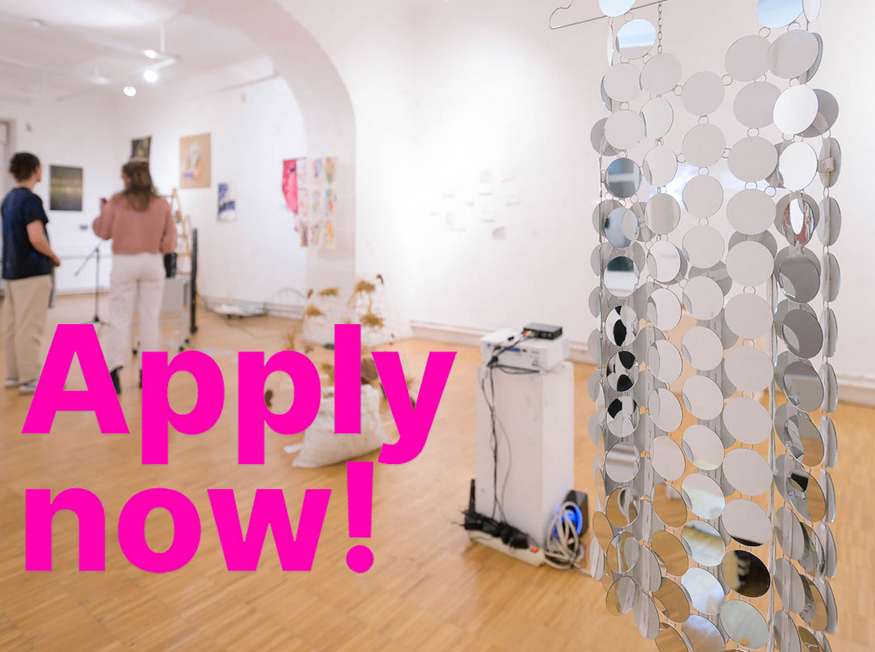
© eselat: Joanna Pianka
Information on the admission exam in Education in the Arts (in German only):
Further articles
Author: Christina Fasching (Red)
Author: Christina Fasching (Red)
